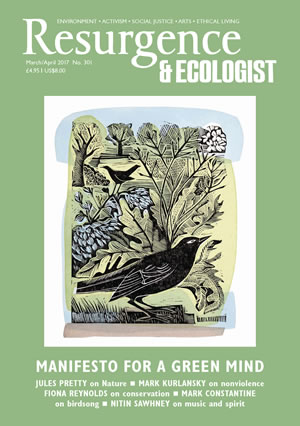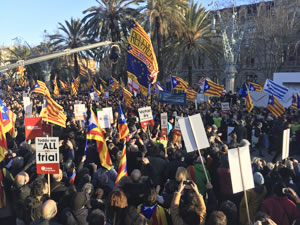The rise of right-wing nationalism in the EU and its increasingly xenophobic and anti-immigration rhetoric are of great concern to many. In a multicultural and globalised world, striving for independence is often equated with nationalism and harking back to the past, and is anathema to the idea of a single humanity. But is that really what it is about?
As someone with a Slovenian, Australian and British background, I have grappled with understanding whether self-rule can be pursued at the same time as multiculturalism. To explore this question as well as those of localism and Brexit, I spoke to Raül Romeva, Minister of Foreign Affairs of Catalonia and leader of Junts pel Sí (‘Together for Yes’), a coalition of parties that was elected in Catalonia in 2015 on a pro-independence platform.
Romeva is a Catalan born in Madrid. He was an independentist a long time before calls for Catalan independence became part of the mainstream political discourse in 2012. The decision of the Spanish Constitutional Court two years earlier pronouncing key provisions of the 2006 Catalan Statute of Autonomy anti-constitutional caused convulsions in Catalonia. The new statute had been approved by the Catalan people in a referendum in June 2006 and by the Catalan and Spanish parliaments. It was part of the rapprochement between the central government and the Catalans to further decentralise Spain.
For Romeva, 11 September 2012 marked the turning point in the independence process. On that day over two million people took part in street manifestations calling for Catalan independence. On 11 September 1714 Catalonia had ceased to be an independent state and had become part of Spain. Ever since that time relations have been strained. They were particularly difficult in the Spanish Civil War and during Franco’s subsequent dictatorship, when the Catalan language was banned and Catalonia’s institutions were disbanded.
Catalonia today is a multicultural and multi-ethnic society. Some 37% of people living in Catalonia today were born elsewhere. The pro-independence movement consists of people of many different ethnic backgrounds and political convictions. As Romeva explains, the reason “why more and more people want Catalonia to become an independent state has nothing to do with nationalism”. Rather, he says, it has to do with the democratic deficit in Spain, the desire to solve day-to-day problems at the local level, and a striving for a different future.
“Calls for independence are not about the exclusion of others, but about the kind of future one wishes for,” he told me.
Catalan independence is not only about localism and self-rule. It is also about securing Catalonia and its people a voice on the global stage so that they can partake in the shaping of decisions crucial to our joint future, be they about climate change, pollution, refugees, the future of the EU or a new world economic order.
In an EU dominated by nations, local and regional voices are rarely heard. Despite years of paying lip service to regionalism and subsidiarity, the EU has done little to ensure multi-level sovereignty – where issues are decided and actions are taken at the administrative level closest to where they will have effect. And Spain prides itself in being a unitary and centralist state. What this means in practice is that autonomous communities like Catalonia are rarely consulted on matters falling within the competence of the state, even if they directly concern them.
The difference between the German approach to devising fisheries policy and that of Spain is a good example of this. As a Member of the European Parliament, Raül Romeva was involved in the discussions regarding the European Common Fisheries Policy. He explains: “When…I met German government representatives to discuss their views on EU fisheries policy, they said to me, ‘We have consulted all the Länder (German states) that have waters and fisheries, and we now present to you the German position.’ When I spoke to the Spanish government and asked what the positions of Galicia and Catalonia were on these issues, the answer I received was that when the central government took a decision it would inform them and ensure that they complied with it. This is one of the reasons why I became convinced that independence was the only solution.”
There is no doubt in my mind that had the EU regionalised, the disenfranchisement people feel today would have been avoided. Romeva agrees, and he points to the fact that “in the case of Catalonia two things have been happening at the same time: Spain has been centralising and the EU has not promoted localism and regionalism. The EU’s Committee of the Regions is practically irrelevant. For decades Catalonia sought a voice at both the Spanish and the EU level but has not succeeded. It is clear,” he adds, “that if you want to be part of the universal debates, you must be a state.”
It seems to me that striving for independence boils down to the need to ensure equality between peoples and a desire for self-rule. When the institutions of a state are not seen as representing the interests of all its people, and the rule of law is not guaranteeing equality between people, trust in the rule of the majority is lost.
Romeva agrees, and points out that “there are many on the left who are for independence in Catalonia precisely because they are anti-nationalist. They believe that a new state of Catalonia will be more just and less corrupt and will pursue more sustainable and social welfare policies than the Spain of today.”
A discussion on the difference between the English and the continental European legal systems led us to discuss Brexit and what it may mean for Catalonia and the EU. Romeva is adamant that the referendum is a tool and that democracy cannot be blamed by those on the left for a referendum outcome that they don’t like.
“The will of the people must be honoured. Anything else would undermine democracy. What happens now is crucial. The UK government will need to build a consensus within the country on what withdrawal from the EU will look like, if it is to avoid a second Scottish referendum on independence.”
I agree. The UK will also need to reach an agreement with the EU. At the same time the remaining member states of the EU will need to find consensus within their own ranks with regard both to negotiations with the EU and to reforming the EU.
While I was writing this article it became clear to me that the world has changed dramatically since the Brexit referendum and the election of Donald Trump as US president. It is a world where new relations will need to be forged and new realities are now a possibility. Raül Romeva and many other Catalans believe that this new reality means that their demand for independence can no longer be ignored by the EU.
The government of Catalonia announced last October that it will try to reach an agreement with Spain to hold a referendum on independence – and that if no agreement is reached by June this year, the Catalan parliament will adopt a law for the referendum to be held in September.
That the Spanish government is not willing to engage in any discussions is clear from its recent actions. It is prosecuting public officials throughout Catalonia including for allowing Catalan pro-independence flags to be flown from government buildings and town halls. More than 300 such cases are currently pending before the courts in Catalonia. Many other actions have been taken against individuals. For example, in December 2016 the counsellor of the town of Vic, Joan Coma, was taken by police before the special court in Madrid to answer a charge of inciting sedition for making statements in public in support of Catalan independence. On 26 October last year the Spanish prosecutor started proceedings against Carme Forcadell, the President of the Catalan Parliament, for allowing a vote in the Catalan Parliament on the Independence Road Map. And on the very day I am writing this article (6 February), the court case that the Spanish prosecutor has brought against former the President of Catalonia, Artur Mas, and two former ministers, Joana Ortega and Irene Rigau, for allowing the 9 November 2014 public consultation on independence to take place in public buildings has started.
With the tensions rising, I believe that the EU must actively facilitate the dialogue between them and Spain. At the very least the EU must ensure that Catalans have the right to hold a referendum on whether the people in Catalonia wish to be independent. This is neither more nor less than the right the Scots exercised two years ago -- when they chose to stay in the UK.







